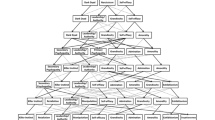Abstract
Siegfried Lenz’s novel Deutschstunde is analyzed on the basis of work conducted by two American psychologists: Stanley Milgram and Lawrence Kohlberg. The concept of duty and obedience to authority are considered as social phenomena that go beyond personal disposition. The article uses Milgram’s famous obedience experiment in order to consider the literary depiction of psychological processes underlying compliance with orders to commit reprehensible acts. A comparison is made between Jens Jepsen, the fictional obedient policeman in Deutschstunde, and Paul Grueninger, a real policeman in wartime Switzerland, who refused to follow orders and saved many refugees at the Austrian border.
Similar content being viewed by others
References
Burgess, Gordon J.A. “Pflicht und Verantwortungsgefühl: Es waren Habichte in the der Luft, Deutschstunde, Ein Kriegsende,” in Siegfried Lenz. Werk und Wirkung. Ed. Rudolf Wolff. Bonn: Bouvier Verlag Herbert Grundmann, 1985, pp. 26--34.
Collins, Barry E and Ma, Laura “Impression Management and Identity Construction in the Milgram Social System,” in Obedience to Authority: Current Perspectives on the Milgram Paradigm. Ed. Thomas Blass. London: Lawrence Erlbaum Associates, Publishers, 2000, pp. 61--90.
Kohlberg Lawrence (1981). The Philosophy of Moral Development. Harper and Row, New York
Kontje Todd (1980). “Captive Creator in Siegfried Lenz’s Deutschstunde: Writer, Reader and Response.”. The German Quarterly 53(4): 458–466
Milgram S (1974). Obedience to Authority: An Experimental View. Harper & Row, New York
Murdoch Brian and Read Malcolm (1978). Siegfried Lenz. Oswald Wolff, London
Paslick Robert H (1973). “Narrowing the Distance: Siegfried Lenz’s Deutschstunde.”. The German Quarterly 46(2): 210–218
Rochat, Franc¸ oit. “Captain Paul Grueninger: The Chief of Police Who Saved Jewish Refugees by Refusing to Do His Duty,” in Obedience to Authority: Current Perspectives on the Milgram Paradigm. Ed. Thomas Blass. London: Lawrence Erlbaum Associates, Publishers, 2000, pp. 91--110.
Weber Albrecht (1975). Siegfried Lenz Deutschstunde. Oldenburg Verlag, München
Zimbardo, Philip. “Reflections on the Stanford Prison Experiment: Genesis, Transformations, Consequences,” in Obedience to Authority: Current Perspectives on the Milgram Paradigm. Ed. Thomas Blass. London: Lawrence Erlbaum Associates, Publishers, 2000, pp. 193--237.
Author information
Authors and Affiliations
Corresponding author
Rights and permissions
About this article
Cite this article
Tumanov, V. Stanley Milgram and Siegfried Lenz: An Analysis of Deutschstunde in the Framework of Social Psychology. Neophilologus 91, 135–148 (2007). https://doi.org/10.1007/s11061-005-4254-x
Published:
Issue Date:
DOI: https://doi.org/10.1007/s11061-005-4254-x



